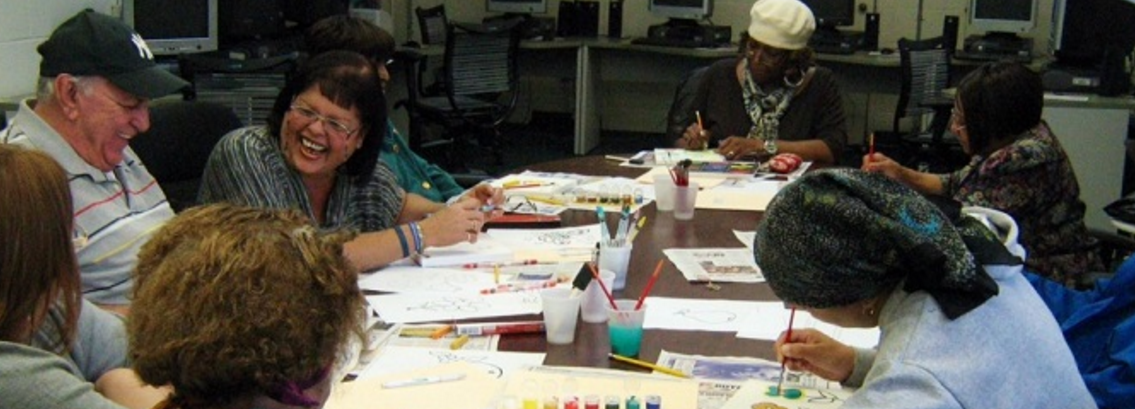A Shoulder To Lean On For Caregivers Of Persons With Dementia & Alzheimer’s


Are you caring for a loved one with Alzheimer’s or another form of dementia? You’re not alone.
This November has been National Alzheimer’s Awareness and Caregiver Appreciation month. Watching a friend or family member steadily lose their cognitive and other functions is a devastating experience, and caring for someone with a degenerative disease is profoundly challenging and isolating.
Consider these statistics:
- In New York City, 1.25 million family caregivers provide over one billion hours of care to elderly loved ones;
- There are 425,000 caregivers in New York City serving those over 65 suffering with Alzheimer’s disease and other dementias;
- Two-thirds of working New York City caregivers report feeling an “overwhelming strain” on their quality of life
These stats come from Presbyterian Senior Services (PSS), a New York City-based non-profit which provides services to older New Yorkers and their caregivers. You don’t need to be Presbyterian to receive help — PSS services are based solely on need.
The organization has received a $7.5 million grant from the State Department of Health to offer supportive services for caregivers of people with Alzheimer’s and other dementias. This includes caregivers who are providing long-distance care.
According to the Alzheimer’s Association, Alzheimer’s is a “disease that attacks the brain.” It is the most common form of dementia; while dementia is a “general term for a decline in mental ability severe enough to interfere with daily life.”
The aging of New York City’s population, and the growing number of older persons in our area, has intensified the need for support for caregivers, says Michelle Laguerre, who directs PSS’ Circle of Care program.
Diseases like Alzheimer’s are very complex and impact the entire family of the affected loved one, Laguerre explained. Dementia, for example, does not just cause memory loss — it leads to physical and behavioral problems, affecting one’s ability to think and regulate their moods.
We spoke with Sandra Goodridge, a Fort Greene resident who is a caregiver for her 87-year-old mother, while also running a consulting business. Goodridge’s mother lives in Brownsville.
Goodridge said she had been looking for help over a year, and saw an ad for Alzheimer’s caregiving and support in May, 2016. After meeting with a PSS case manager, she joined a support group for dementia caregivers.
Goodridge said that joining the support group has been invaluable. “It normalizes your whole experience.” Caring for someone with Alzheimer’s or another type of dementia is “not something that people really want to talk about…we find that we have a lot in common.”
PSS helped Goodridge secure 8 hours of respite care a month, so she can take a break while knowing her mother is being looked after. Through PSS, she also found a home health aide for her mother, who comes two days a week, Goodridge said.
“It’s been a big life changer to get support,” Goodridge told us. PSS offers counseling and even small financial grants so family members can get needed services, she said.
Anyone interested in services for caregivers should call the PSS hotline at 866-665-1713, Monday through Friday, from 9am to 5pm. Or email: careinfo@pssusa.org.
PSS also operates Care Stations throughout the five boroughs, where caregivers can meet with a PSS staff person. Laguerre said that it’s best to call PSS first and make an appointment. PSS staff will also visit the caregiver if they can’t get out, or do a consultation by phone.
After meeting with the caregiver and conducting an assessment, PSS will try to determine which services could be helpful. These include:
- respite services so caregivers can take a break while someone else cares for their loved one;
- support groups;
- assistance finding a home aide or nursing home;
- family consultations;
- educational trainings on topics like Medicaid benefits;
- joint enrichment activities for the loved one and his or her caregiver. These activities are designed for people with cognitive impairment and memory loss.
PSS Care Stations are open at the following Brooklyn locations twice a month.
Clarendon Library in Flatbush — Clarendon Road & Nostrand Avenue — every other Tuesday
Mapleton Library in Borough Park – 17th Avenue & 60th Street — every other Tuesday
St. Gabriel’s Church in Prospect-Lefferts Gardens — 331 Hawthorne Street — every other Wednesday
PSS is always looking for new community organizations and institutions with whom to partner, Laguerre said. The point is not just to help individual caregivers, but to increase the capacity of community institutions to support them as well.
In Sandra Goodridge’s case, emotional support and caregiving services have reduced her stress and worry. It’s a “huge difference in my quality of life, and quality of life for my mom,” she said.




